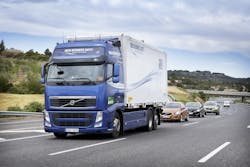The SARTRE (Safe Road Trains for the Environment) — a unique project investigating the potential for integrating road trains of platooned vehicles in a mixed environment with other road users — has been “successfully” completed in Europe.
Volvo Car Corp., the only participating car manufacturer in SARTRE, recently announced the success of the project. The road trains tested included a manually driven lead truck piloted by a professional driver followed by another truck and three Volvo cars (S60, V60 and XC60). In the most recent testing, Volvo was able to achieve consistent speeds of about 55 mph with the cars driving at a four-meter gap.
“The basic principle is that the following vehicles repeat the motion of the lead vehicle,” said Erik Coelingh, technical specialist at Volvo Car Corp. “To achieve this we have extended the camera, radar and laser technology used in present safety and support systems such as Adaptive Cruise Control, City Safety, Lane Keeping Aid, Blind Sport Information System and Park Assist Pilot.”
The long-term vision is to create a transport system where joining the road train will be more attractive and comfortable than leaving your car behind and using public transportation on long-distance trips, Coelingh said.
Parallel with the attractive possibility to do other things while driving, the road train brings several other crucial advantages, he added:
- It promotes safer transport. A professional driver leads the vehicle platoon, for instance in a truck. Inter-vehicle reaction response times are very quick thanks to the coordinated technology.
- Environmental impact is reduced. The cars drive close to each other and reap the benefit of lower air drag.
- The reduced speed variations improve traffic flow, creating more efficiently utilized road capacity.
“The energy-saving potential is 10-20%. This means that the journey to your holiday destination doesn't only become more comfortable and safe. The money you save on reduced fuel consumption can be spent on lunch by the beach instead,” said Coelingh.
“Road train information and operation will of course be integrated in the Volvo Sensus infotainment system when the technology is ready for production. Booking, joining and leaving the road train must be easy and smooth,” added Coelingh. “Another challenge is to create a system that handles the cost aspects. It is logical that taking the road train will include a fee or an income, depending on whether you own a lead vehicle or a following vehicle.”
Recognizing that the challenge of implementing road train technology on Europe’s highways is not solely a technical matter, SARTRE also includes a major study to identify what changes will be needed for vehicle platooning to become a reality.
“There are several issues to solve before road trains become a reality on European roads. As the leader in car safety, Volvo Car Corp. is particularly focused on emergency situations such as obstacle avoidance or sudden braking. However, we are convinced that road trains have great potential,” said Coelingh.
The SARTRE project is partially funded by the European Commission under the Framework 7 program. The project is led by Ricardo UK Ltd and comprises collaboration between the following companies: Applus+, IDIADA and Tecnalia of Spain, Institut für Kraftfahrzeuge (ika) of the RWTH Aachen University of Germany, and SP Technical Research Institute of Sweden, Volvo Car Corp. and Volvo Group of Sweden.
